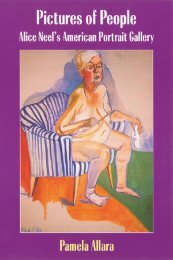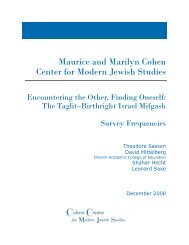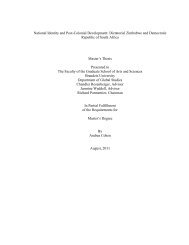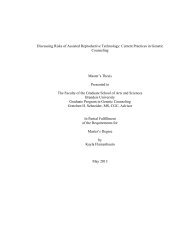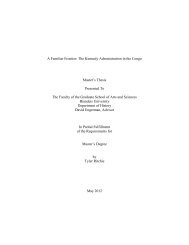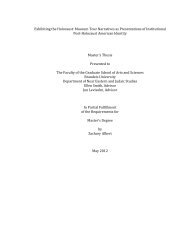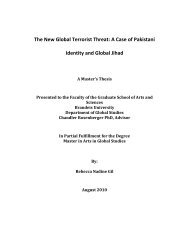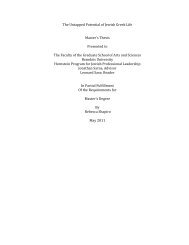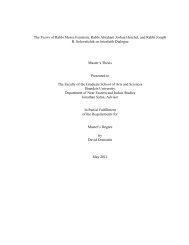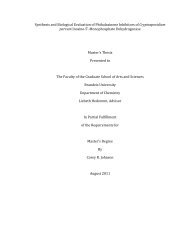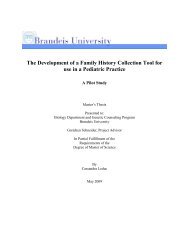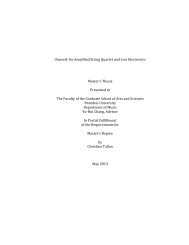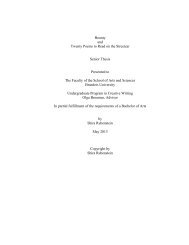Ezra Taft Benson and the State of Israel - Brandeis Institutional ...
Ezra Taft Benson and the State of Israel - Brandeis Institutional ...
Ezra Taft Benson and the State of Israel - Brandeis Institutional ...
- No tags were found...
You also want an ePaper? Increase the reach of your titles
YUMPU automatically turns print PDFs into web optimized ePapers that Google loves.
when <strong>the</strong>y discard <strong>the</strong> eternal truths <strong>of</strong> <strong>the</strong> gospel.” 110<strong>Benson</strong>, having been raised <strong>and</strong>remained an active member <strong>of</strong> a faith that had long supported Jews as <strong>the</strong> chosen people,felt deep sorrow for his <strong>Israel</strong>ite family, but takes no blame upon himself for <strong>the</strong>ir terriblesuffering.In examining <strong>Ezra</strong> <strong>Taft</strong> <strong>Benson</strong>'s views on <strong>Israel</strong> through a religious lens, we mustconclude that those views are clearly affected by <strong>the</strong> Christian beliefs <strong>of</strong> hiscontemporaries, but are essentially <strong>the</strong> result <strong>of</strong> <strong>the</strong> traditional teachings <strong>of</strong> his Mormonfaith. His pr<strong>of</strong>essed <strong>and</strong> unequivocal kinship with <strong>the</strong> Jews, along with a confidence that<strong>the</strong>ir “old-new” 111 homel<strong>and</strong> was <strong>the</strong> fulfillment <strong>of</strong> both ancient <strong>and</strong> modern prophecy,make him both comparable to <strong>and</strong> yet distinctive among Christian leaders <strong>of</strong> <strong>the</strong> day.However, although Mormon, <strong>and</strong> specifically <strong>Benson</strong>'s, perspectives may have echoedChristian sentiments, Latter-day Saints generally remained outside <strong>of</strong> <strong>the</strong> Protestant-Catholic-Jew ecumenism that prevailed in <strong>the</strong> 1950s. It is also interesting to note that<strong>Benson</strong>'s pr<strong>of</strong>essed kinship with <strong>the</strong> Jewish people, while certainly appreciated (as will bedemonstrated in <strong>the</strong> subsequent chapter), was somewhat one-sided. But it never wavered.<strong>Benson</strong>'s doggedly religious approach to <strong>Israel</strong> accompanied him into his politicalwork as well. As Secretary <strong>of</strong> Agriculture, his religious sense <strong>of</strong> purpose revealed itselfin his combating what he saw as socialist government policies in farming. In <strong>Israel</strong> it wasreflected in his comments <strong>and</strong> descriptions <strong>of</strong> his visits, <strong>and</strong> <strong>the</strong> unique delight he took in110111Dew, Biography, 212.Term borrowed from Theodore Herzl, in <strong>the</strong> title <strong>of</strong> his book, Altneul<strong>and</strong>, 1902, which means “old-newl<strong>and</strong>.”39



